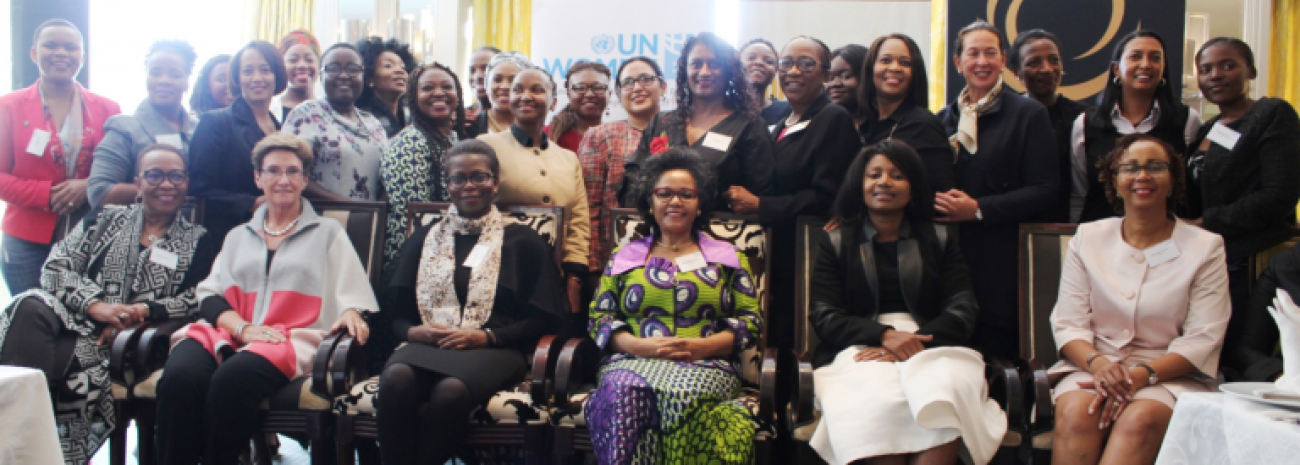Women business leaders, women associations and entrepreneurs as well as social and economic experts gathered in Johannesburg for a high-level dialogue to explore strategies to make the South African economy work for women and to advance gender equality and achieve the Sustainable Development Goals (SDGs). Hosted by UN Women South Africa Multi-Country Office (SAMCO) and Motseng Investment Holdings, the event was also used as an opportunity to engage with the recently appointed Presidential Economic Advisor, Trudi Makhaya and the Presidential Special Envoy on Investment, Phumzile Langeni, who is also the Executive Chairperson of the Afropulse Group.
Aside from advising the president on economic policy decisions, Ms. Makhaya will oversee a drive to attract $100 billion over a five-year period in new investments in South Africa by a group of new investment envoys. These envoys include Ms. Langeni, former Finance Minister Trevor Manuel, former Deputy Finance Minister Mcebisi Jonas, and the Chairperson of Liberty Group, Jacko Maree.
The high-level dialogue on gender issues forms part of on-going advocacy initiatives linked to UN Women’s flagship programme on “Stimulating Equal Opportunities for Women Entrepreneurs through Affirmative Procurement, Investment and Supply Chain Policies”. The programme seeks to improve women’s access to public and private procurement of goods and services and link women to the value chain of opportunities in key sectors such as agriculture, energy, and infrastructure. In South Africa, expenditure on public procurement averages R635 billion ($45.4 billion) annually, and of that women only access about 57 billion ($4 billion) or 9%. In her opening remarks, UN Women SAMCO Representative Anne Githuku-Shongwe posed a critical question: “What would the economy look like if it really worked for women?” She suggested dismantling negative norms and stereotypes that lead to discrimination and inequality as a starting point.
“Patriarchy holds us back and patriarchy defines the macro-economic framework of our countries—the entire framework is designed as if women don’t exist,” she told the high-level gathering. Ms. Githuku-Shongwe called for investments that explicitly benefit women since most of the times international capital does not filter to women-owned enterprises but rather perpetuate inequalities.
Reflecting on scalable solutions that accelerate women’s economic empowerment, UN Resident Coordinator in South Africa Nardos Bekele-Thomas appealed for women to be supported to achieve equal economic participation through women-specific business solution centres in townships and rural areas.
“These business solution centres would provide all the services and a judicious mix of all the ingredients that would make their businesses succeed,” said Ms. Bekele-Thomas. “It would give evening classes in marketing and entrepreneurship and help them build business plans, carry out feasibility studies and get information. It could enable us to disseminate information on procurement and prepare them to take up such opportunities.”
Responding to the central question on how economic models can work for women, Ms. Makhaya said opening the economy to accommodate a variety of business models was crucial to equitable development.
“A women-centred economy would be human centred. Our economy is focused on a few sectors and a few models, so it’s important to open it up,” she noted. “How do we create space for diverse models and create space for black people and for black women? Have we created space for cooperatives? When we don’t have an alternative, we think only about growth and everything else falls away.”
Ms. Langeni added that there was a clear mandate for money raised by the envoy investment team to come in and create employment.
“We need to ensure that local and foreign investments are very direct, we need to create jobs and therefore that means factories must be built, including schools, hospitals and infrastructure,” she said. “We need to further develop our services industry but more importantly we need to ensure that we’ve got a skilled human resource capability that will carry the country forward. That is our purpose, to make sure that as investment comes, it is directed at ensuring that every South African feels part of the South African dream.”
In her concluding remarks, Nozipho January-Bardill, the Chair of the UN Global Compact, noted the complexity inherent in transforming the economy and making women central to it but also ensuring that poor people who really feel the brunt of economic decisions can benefit.
“Our next step is for us to better understand what growth is—growth has enriched a few people, impoverished many and destroyed the environment. We need to talk about growth that takes care of people’s basic needs,” said Ms. January-Bardill, adding that success in women-owned businesses benefiting from preferential procurement, for example, needs to be assessed and replicated.
UN Women will continue to facilitate a series of engagements on Women in the Economy to strengthen the evidence-based knowledge around women’s economic participation and to examine how South Africa’s commitment to gender equality can be translated into a women-centred economic growth model, including economic reforms that propel gender equality.







